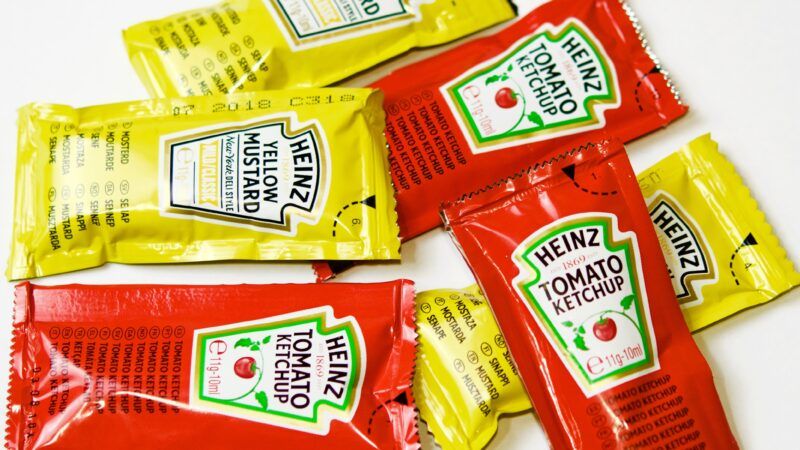To Fight Climate Change, Los Angeles Bans Restaurants From Giving Out Unsolicited Ketchup Packets
Businesses that give customers condiments without them first asking for them could receive fines totaling $300.

Some Los Angeles politicians seem to relish micromanaging the behavior of businesses and consumers.
Beginning this week, a new city law goes into effect forbidding restaurants with 26 or more employees from handing out ketchup and mustard packets without the customer first requesting them. Come April 2022, it will apply to all restaurants.
The intent of the new ordinance—which also restricts the distribution of other single-use items like napkins and utensils—is to prevent waste and combat climate change, according to its authors.
"If we are to overcome the extreme climate challenges we face, we will have to alter or otherwise transform all our habits relating to fossil fuel products, including plastics, and our essential natural resources, like forests," said Councilmember Paul Koretz, co-author of the ordinance, in a Tuesday press release. "These goods are also sustaining the fading fossil fuel industry, which is a major contributor to climate change," added Councilmember Paul Krekorian, another co-author.
Businesses will be given warnings for first and second violations of the ordinance, and a $25 fine for each day the business is out of compliance after that. Fines for individual businesses are capped at $300 per year.
The new policy also applies to food delivery services like DoorDash and UberEats. From now on, people will have to order condiments and utensils as separate menu items instead of the old practice of expecting them to be provided in the bag.
Los Angeles' ordinance passed back in June. It mirrors a state bill signed into law by Gov. Gavin Newsom, a Democrat, in October that requires localities to start enforcing a condiment- and utensil-on-request policy by June 2022 at the latest.
The written comments submitted to the Los Angeles City Council in regards to its ordinance, from both the public and businesses, are near-uniformly positive.
Delivery platform Grubhub said it would benefit its partner restaurants who no longer have to waste money by giving customers a product they don't want (perhaps under the mistaken belief that they were required to do that before).
Others said the ordinance would relieve the psychic distress they feel at the accumulating pile of plastic utensils in their kitchen.
"We all have an entire drawer full of plastic utensils from the takeout places we've ordered from. All of that plastic plagues our mind with guilt until we throw it all away and start the cycle again," said one commenter, who urged the city council to "make the right choice for businesses, consumers, our city, and our environment."
That amount of concern feels misplaced. Certainly, those who are deeply concerned about climate change have plenty of other things to worry about in the greater Los Angeles area. That includes the roughly 5,000 active oil wells in Los Angeles County and the reported 222 million miles county residents drive each day.
It's also an open question of how much this new law will actually reduce people's consumption. It's likely that businesses would be less generous with their ketchup packets even without the law, given reported shortages of that product. The penalties are also minor enough that many businesses could easily afford to not comply
True, there are few victims of this new law, save for those people who forget to ask for dipping sauce and thus must munch on dry, uncovered fries. Yet the pettiness of the law makes it all the more offensive.
Los Angeles has no shortage of problems that policy makers they could be addressing, from housing affordability to homelessness. Instead, they've decided to spend their time mandating a new, pointless ritual that will inconvenience a few and benefit no one.
